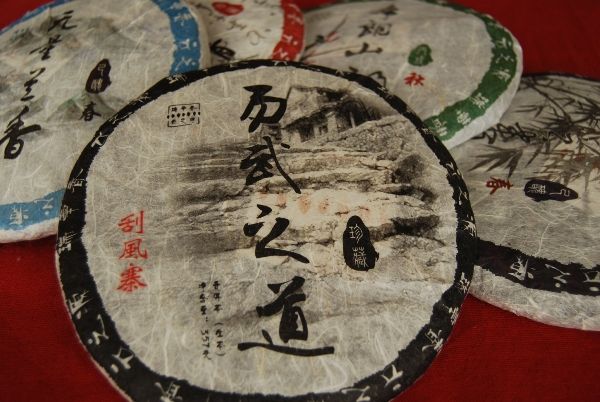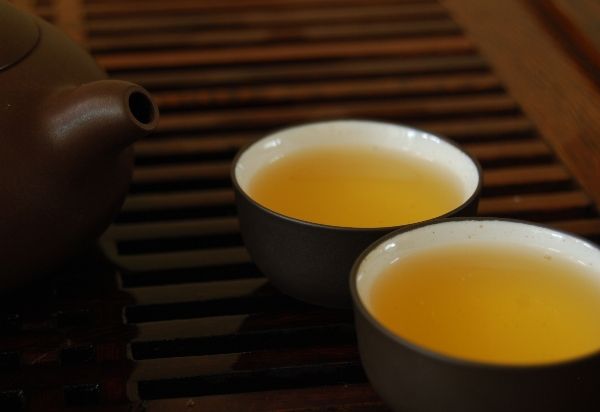This year, Yunzhiyuan [cloud's source] and Ruicaoxiang [auspicious grass-scent] have created a bunch of cakes from around Yunnan. A subset of these are "Yiwu zhi dao" [Yiwu's Road, or "Road to Yiwu" as YS calls them], of which this is the first cake. In 2009, many of the large Western vendors (Nadacha, Yunnan Sourcing, Dragon Teahouse, and Puerh Shop) are selling their own pressings.
This year is the first that I've ever heard of Guafengzhai, a small village somewhere in the Yiwu border region near Laos. However, I've had two Guafengzhai cakes myself so far this year, and ST appears to have come across a third.
All of these YS cakes were pressed in Jonghong, the capital of Xishuangbanna. This Guafengzhai is the most limited, being a production of just 84 cakes, whereas the others seem to be in the 400+ numbers.
This tea smells amazing. I opened the little foil bag (I bought all of my own samples, conflict-of-interest monitors will be relieved to hear) and was immediately bowled over by an immensely pungent aroma of greenest shengpu. It smells of intense fruits and immediately filled the lounge.
As you can see from the image above, the cake consists of medium-sized leaves, which are mostly pressed in large fragments. There are few tips, plenty of huangpian [yellow flakes], and quite a few stalks. I rather approve of "messy" blends like this, as they can be quite complex.
I've been drinking far too many heavy-orange 1-year cakes lately, and so it was refreshing to see that this pu'er brewed a dazzling orange (pictured above). Just like the dry leaves, it has big, bold scents of sweetness that are heavy with buttery sugar.
Just like the lovely old-tree Yiwu maocha that I was fortunate enough to receive from Nadacha, this tea is clean, bright, and sweet. It's hard to estimate its future performance, given the immensity of its green character, which should probably have been left for several more months. However, compared to its peers, it gives the impression that it is chock full of complex content, and that can only be a good thing in my book. The entire experience is bold, full, and, happily, it commands the attention.
I liked this cake the most of all five, and, while I must confess to buying a cake of each, I did buy two of this Guafengzhai. Like the other Guafengzhai I've had this year, it seems clean, forthright, and filled with charm that I hope will give it plenty of scope for improvement over the years.
(This was "alpha" in our tasting event.)
(This was "alpha" in our tasting event.)
Addendum
November, 2012
Apache is unimpressed by the aging of this cake; I have not tried it since 2009. However, the dark leaves have a decently humid and sweet scent, suggestive of some progress being made.
The soup is orange where once (see above) it was yellow. What was once buttery and sweet is now lower, darker, and has the character is humid, sweet straw. It has an obvious cooling sensation, too, which is decidedly good news.
All of the upper layers of flavour and fragrance have fallen away, leaving the base. It is this base that has developed with age: it tastes woody, malty, and similar to the base of older cakes. It is not a calming cake, however, and after just four small cups, I feel nervously alert, edgy, and brittle. It reminds me of Apache's 2001 7542. I perspire obviously.
The price of this cake has since gone through the roof, but the original is tidy, enjoyable, and aging well.





Hi folks!
ReplyDeleteI used 4g leaf in 60-90 ml water per infusion; time ranging from some seconds to few minutes. Porcelain gaiwan and cup.
The dry leafs smell surprisingly mellow. Dark honey, mild smokiness and a bit of mushroom. The leafs have a intense dark green with some silver tips in between. As far as I can tell from the sample, those tips are present homogeneously in the cake. Good quality. The compression seems to be just right, not too strong.
The taste is very mellow too: some sweetness, some sourness and no bitterness. I just didn't get the tea to release some bitterness. The flavor begins with dark honey and mild smokiness with a hint of citrus following and resulting in a great mushroom taste ("Champignon"). Later infusions gave me some tickling sensations in the mouth, a feeling of energy was in the brew (good chi?).
Fazit: The tea has a nice flavor, is not too plain and has some energy. Because of its mellowness and its lack of bitterness it is a great drink-now-pu'er. But it isn't the pu'er I am looking for in terms of storage.This tea is very "lucha"-like with the typical flavor of pu'er. I miss the wilderness in smell and taste, the feeling that I am sipping the juice of a beast, which I subjectively relate with the ability to age.
P.S.: I will never ever eat cucumber before sipping a tea! The taste of it lingered on very long and interfered with the tea taste..
Alpha,s leaf smelled pungently fresh and green with a tangy sour aspect. Using 9 gm. of leaf for 6 oz. Yixing and 15 second infusion times the tea brewed a crystal clear yellow cup with the slightest tinge of apricot. The flavor are very well balanced, under ripe pears and nutty, as in a cashew maybe. Slightly astringent and comfortable amount of bitterness. The flavors dont run deep but what is there is nice. Alpha retired so early that it was nessesary to adjust parameters a bit, more leaf, flash infusions. Problem solved. As far as durability was concerned. I liked Alpha,s flavor profile a lot but what I didnt like about it was the almost chalky bitter aftertaste. Not a clean, crisp, bitterness that I expect but something much more brutal. This bitterness hunkered down and made a new home for itself. I served it with an eviction notice by way of water but it wouldnt leave. All in all, Alpha,s flavors are quite nice but that aftertaste, Whew!
ReplyDeleteFirst, kudos to Scott at YSLLC for providing these samples. The tea is beautiful and the compression is just right. Now for the taste....
ReplyDeleteMy notes on "alpha" sample:
Nice looking leaves, fair amount of white tips
Aroma:orange peel, sour plum, sweet candy
Soup: light yellow, gets a bit more orangey with air (and later infusions), but not super tweaked
Taste: Starts out very light. Milky texture, elegant. Some funk, weird chemical aftertaste, drying, rough on the throat.
Not a big fan of this one, and seems to get worse as you drink it. Reminds me a bit of Hai Lang Hao productions.
Check out the entery on MattCha's blog for detailed notes and pictures:
ReplyDeletehttp://mattchasblog.blogspot.com/2009/09/yunnan-sourcing-mystery-sample-alpha.html
One can copy notes in the comments if you want?
Peace
I didn't realize this was being done blind! I requested too late to get an official allotment, so I ordered a set from YSLLC, and I have been drinking the samples non-blind. Might as well share my methodology anyway and reserve the results for when you guys find out what you have been drinking. I have been brewing two at a time, randomly chosen, in identical gaiwans, competition style, which for me means 1.5 grams, 100ml water just off the boil, for 6 minutes. I then do a second steep for around an hour, long enough for the liquor to get quite cool. I have done three rounds so far, so I've already had every tea once. Eventually I'll post an edited version of my notes on my blog, which at the moment isn't a blog at all. Really looking forward to comparing notes.
ReplyDeleteHi chaps,
ReplyDeleteThanks for the notes! I liked this cake the most of the five, and was the only one of which I bought two. I'll pop my notes up when I get a chance.
Toodlepip,
Hobbes
P.s. Matt - don't worry about copying your notes over from your blog.
Hey there,
ReplyDeleteI am very impressed, how different the perception of one tea can be. Sure, the water, kind of brewing and teaware is different, but the main difference seems to be the person tasting it.
So, I am eager to read some more reviews of other happy ones who have received a sample. ;-)
Hobbes: I am not sure if you wish for me to upload my rather lengthy discussion of this tea, but I've got it here at my blog:
ReplyDeletehttp://39steeps.blogspot.com/2009/09/review-series-pu-erh-alpha-by-yunnan.html
In all, I had a great time. Thank you for giving me the opportunity to participate.
Dear Steven,
ReplyDeleteNo - you can just leave it there if you like, thanks. It's a great article! I liked the Watterson :)
Toodlepip,
Hobbes
Sorry guys, I am suffering from a cold so I could not participate
ReplyDeletein "alpha"...but it sounds good !!
Anyways, I am sure I can join with
"beta" next week !!
Hobbes, I agree that it's a great article, if by "great," you mean, "large in size and duration." As Nigel Mellican reminded me last night, Lu Tung Pin wrote,
ReplyDelete"The first bowl sleekly moistened throat and lips,
The second banished all my loneliness
The third expelled the dullness from my mind...
And by the time I hit the sixth cup, I was typing 100 words a minute and had lost entirely the will to self-edit."
(Yes, I know: Chinese translation can be pretty difficult.)
But thank you for the compliment of reading! I am looking forward to the "Beta" tasting.
ReplyDeleteDear Kim,
ReplyDeleteGet well soon! Colds are frustrating - you can't taste tea.
Dear Steven,
I've got an article queued for "beta" which should be publishing tomorrow - I look forward to reading your thoughts on it.
Best wishes both,
Hobbes
Sorry for the late feedback/post here. Notes and pics in here http://puerhcollection.blogspot.com/2009/09/tea-tasting-event-half-dipper-ys.html
ReplyDeleteThis is my fav. in this event. It is balanced, good broth, nice degree of bitterness which will help develop its huigan too.
Classic yiwu character
It is nice, isn't it. Thanks for the notes, Kenny.
ReplyDeleteOk, since everyone seems to be posting their impressions here in the comment section, I will too.
ReplyDeleteAlpha:
What a generous sample! I’ve probably got about 20 oz. here, most of it in one big chunk. Silvery buds adorn the top surface of this beeng, with small leaves crammed together in the layers beneath. The dry aroma is sweet tobacco and mouth-watering. In the wengxiangbei, there is a faintly smoky greeting, followed by
a long and strong jaggary sweetness. On the tongue and lips, a promising silky introduction which collapses suddenly in a disappearance of flavor, leaving a slightly unpleasant metallic flavor on the sides of the tongue. But just as I am losing interest, a sweet and floral huigan enters the mouth and sinuses, and I’m encouraged towards the second infusion. In the second, with the silkiness diminishing, the weak and slightly metallic flavor becomes more of an issue. It’s not bad, per se, but rather, a good tea seriously flawed. If I were being kind, I’d say it had an “open center”. The huigan is very nice, patiently persistent, with floral high notes in it.
Great stuff - thanks, Carla.
ReplyDeleteToodlepip,
Hobbes
I'm a bit late, but -
ReplyDeletehttp://tuochatea.blogspot.com/2009/09/alpha-yi-wu-gua-feng-zhai.html
Thanks, Tomas =)
ReplyDeleteGood spiritual feeling with this tea? But out of the wilderness. That's because it would be preferable that the beast of a tea would kick some sense into the drinker. This is actually a good way to describe the feeling sought by many Pu-erh drinkers, especially those who prefer the young, raw kind. It's explained here that it's a sign the tea would be good for aging. My personal take on this is that I'd like that wildness while it lasts, though aging it does have a certain attraction. --Teaternity
ReplyDelete